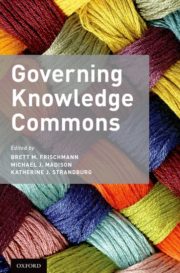
“Knowledge commons” describes the institutionalized community governance of the sharing and, in some cases, creation, of information, science, knowledge, data, and other types of intellectual and cultural resources. It is the subject of enormous recent interest and enthusiasm with respect to policymaking about innovation, creative production, and intellectual property. Taking that enthusiasm as its starting point, Governing Knowledge Commons argues that policymaking should be based on evidence and a deeper understanding of what makes commons institutions work. It offers a systematic way to study knowledge commons, borrowing and building on Elinor Ostrom’s Nobel Prize-winning research on natural resource commons. It proposes a framework for studying knowledge commons that is adapted to the unique attributes of knowledge and information, describing the framework in detail and explaining how to put it into context both with respect to commons research and with respect to innovation and information policy. Eleven detailed case studies apply and discuss the framework exploring knowledge commons across a wide variety of scientific and cultural domains.
Reviews
‘Governing Knowledge Commons comes at the right time with the right mix of case studies for inferences on when, how, and for how long, commons institutions can provide production incentives while mitigating those for free riding. Increasingly, advances in knowledge, research, and solutions to economic and social problems occur where individual property rights are absent. Common property institutions can make productive cooperation possible, and this volume helps in understanding the linkages between the commons and creativity.’
‘The editors and contributing authors for this work are leaders in the movement to create a better understanding of knowledge commons governance, which holds the promise of leading to greatly improved innovation economics and processes. They are to be commended for creating this really excellent collection.’
Eric von Hippel, T. Wilson Professor of Innovation Management, MIT Sloan School of Management
‘Around 1985 Richard Stallman invented ‘copyleft’ to enforce sharing among dispersed computer programmers. Since then many other governed commons have evolved, or been recognized, using the tools of Elinor Ostrom and her co-workers. This valuable work unites structured analysis with case histories to further our understanding of how different sharing communities work. This is crucial information for societies hoping to resolve the dilemmas now afflicting the production, preservation, adaptation, and interplay of intellectual products.’
‘This book takes up the challenge of examining the governance of ‘knowledge commons’ involving the sharing and creation of data, information, and knowledge. It extends the Institutional Analysis and Development (IAD) framework developed by Elinor Ostrom to study natural resource commons and applies the adapted framework to study a set of very interesting cases. The result is a fascinating collection of cases studies of knowledge commons ranging from the Galaxy Zoo citizen science/crowd-sourcing project to Open Source Software and the Sourceforge repository.’
Tony Hey, Vice President, Microsoft Research
Read the Book via Oxford Scholarship Online
Governing Knowledge Commons by Brett M. Frischmann, Michael J. Madison, and Katherine J. Strandburg [Open Access version]
Learning from Lin: Lessons and Cautions from the Natural Commons for the Knowledge Commons by Daniel H. Cole [Open Access version]
Between Spanish Huertas and the Open Road: A Tale of Two Commons? by Yochai Benkler [Open Access version]
Constructing the Genome Commons by Jorge L. Contreras [Open Access version]
Governing Genomic Data: Plea for an “Open Commons” by Geertrui Van Overwalle [Open Access version]
The Rare Diseases Clinical Research Network and the Urea Cycle Disorders Consortium as Nested Knowledge Commons by Katherine J. Strandburg, Brett M. Frischmann, and Can Cui [Open Access version]
Commons at the Intersection of Peer Production, Citizen Science, and Big Data: Galaxy Zoo by Michael J. Madison [Open Access version]
Toward the Comparison of Open Source Commons Institutions by Charles M. Schweik
Governance of Online Creation Communities for the Building of Digital Commons: Viewed through the Framework of Institutional Analysis and Development by Mayo Fuster Morell [Open Access version]
Creating a Context for Entrepreneurship: Examining How Users’ Technological and Organizational Innovations Set the Stage for Entrepreneurial Activity by Sonali K. Shah and Cyrus C. M. Mody [Open Access version]
An Inventive Commons: Shared Sources of the Airplane and Its Industry by Peter B. Meyer [Open Access version]
Exchange Practices among Nineteenth-Century U.S. Newspaper Editors: Cooperation in Competition by Laura J. Murray
How War Creates Commons: General McNaughton and the National Research Council, 1914–1939 by S. Tina Piper
Labor and/as Love: Exploring the Commons of Roller Derby by Dave Fagundes
Legispedia by Brigham Daniels
Conclusion by Brett M. Frischmann, Michael J. Madison, and Katherine J. Strandburg
About the Editors and Contributors
Editors
Michael J. Madison is Professor of Law at the University of Pittsburgh
Katherine J. Strandburg is the Alfred B. Engelberg Professor of Law at New York University
Contributors
Jorge L. Contreras is Professor of Law at the University of Utah
Can Cui practices law with Morrison & Foerster
Brigham Daniels is Professor of Law at Brigham Young University
Dave Fagundes is Baker Botts LLP Professor of Law at the University of Houston
Peter B. Meyer is a Research Economist in the United States Bureau of Labor Statistics
S. Tina Piper is Associate Professor, Faculty of Law, at McGill University